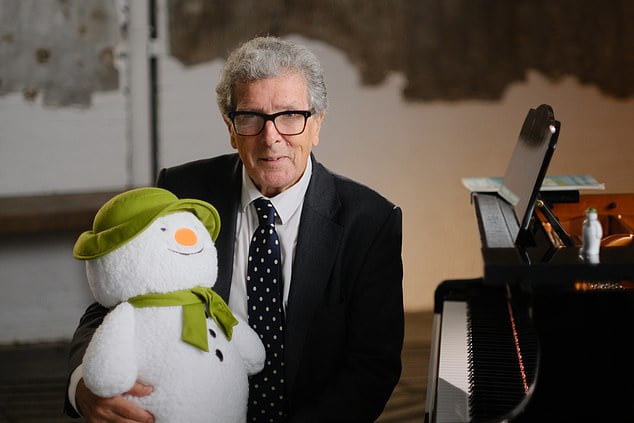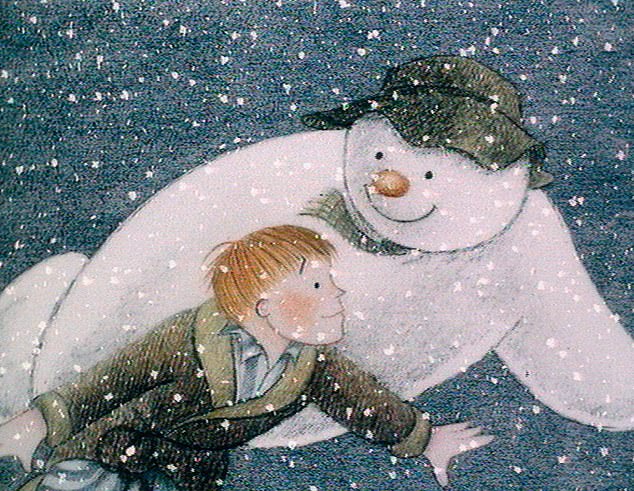Howard Blake: I’ve made three money mistakes – my first, second and third wives!
>
Legendary musician Howard Blake was paid nothing upfront to write The Snowman’s music and lyrics.
Instead, the savvy composer of the classic Christmas animation held on to his royalty rights.
The 84-year-old now depends on his income from royalties to supplement his state pension and fund his lifestyle in Kensington, west London.

Legend: Legendary musician Howard Blake was paid nothing upfront to write The Snowman’s music and lyrics
He lives in a large studio with a 16-foot ceiling and galleries, not far from Kensington Palace Gardens.
He tells DONNA FERGUSON that he is not interested in money as long as he has enough to live, eat and write music.
News about Howard and his autobiography, Walking In The Air Can Be Dangerous, is published on his website howardblake.com.
What did your parents teach you about money?
Nothing, nothing at all. My father was a civil servant and worked at the telephone exchange on Shaftesbury Avenue in London. My mother had also worked as a clerk in the telephone service.
She stopped working after having me and my brother. My father paid her three pounds a week for housework, which was not much then. He was part of the Plymouth Brethren, a strict sect of Christianity.
Money was tight, even though my father earned a good wage. He was just mean. He spent all the money he had on himself. With us he bought everything second hand, so nothing ever worked.


Classic: Howard Blake wrote The Snowman lyrics sitting in a lounge chair in a park in four hours
When I was 13, all my friends got road bikes. My father bought mine secondhand, even though he could afford a new one. When I was going downhill the brakes went. I crashed into a wall and broke my arm. I think my aversion to money and people who just take care of themselves stems from a hatred of my father’s behavior.
Have you ever had trouble making ends meet?
Yes, when I came out of the Royal Academy of Music. I had to look for a job and at first I couldn’t. I was 23. At one point I was working as a doorman in a hotel in Brighton. I also worked as a waiter.
I was extremely interested in both film and music. When I was 24 I got a job as a projectionist at the National Film Theater where I earned nine pounds, ten shillings, a week. That was fantastic work and while I was there I had my own film made and shown.
But even though I was making a good wage, I wanted to play the piano and the only place to play was in pubs. So after two and a half years as a projectionist, I got exactly that job. From that moment on I have been able to live my whole life from music.
Ever paid ridiculous money?
I don’t make music for money. I make music because I like to make it.
What was the best year of your financial life?
It was 1967. I got by, played the piano in pubs and nightclubs, nothing special. I then started playing for singer Lisa Shane who had taken over from Barbra Streisand in Funny Girl. One day I drove her to Yarmouth for a concert.
Her husband came over and it turned out he was a movie producer making The Italian Job. He asked me if I wanted to work with him on the film. I did. So I played piano for The Italian Job and arranged with Quincy Jones. Then I was signed up by a top agent to write music for movies. It was a life-changing year.
How did you get the job at The Snowman?
It was the result of a friend, Gerald Potterton. He helped produce an animated film – The Happy Prince – about a bird flying to Egypt.
He sent me the script and I got to work on the music. But when I called him to say I had a great tune called Walking In The Air, he said, “I’m terribly sorry, but they’ve given the job to someone else.”
Eight years later, over lunch with Gerald, I met John Coates who made the Beatles’ animated film Yellow Submarine. He told me he had been offered a movie called The Snowman, and he asked me to watch it – seven minutes long with stills. I looked at it and said I might have the tune.
Three days later I recorded it and when I played it back to him I told him I wanted to develop the project into a half hour movie with nothing but music. John said, “Impossible.” I told him to try Channel 4. Jeremy Isaacs, the founder and CEO, said, ‘This is brilliant, we’re going to make it.’
First I wrote a full score on the piano so the animators could get to work. I showed it to some friends and they both said, ‘That piece when it flies in the air, you have to put words to it, it has to have a voice. I realized they were right.
So I thought, I’ll walk in the park and sit in a recliner and write the lyrics. And there was something in my brain that connected the words “walking in the park” and “flying in the sky.” I coined the phrase ‘Walking in the air’. I decided that would be a good title for the song. I started at 12 o’clock, went on a picnic, sat down in the recliner and by 4 o’clock I had finished the text.
How much did you get paid for The Snowman?
When I was writing the music and lyrics, I didn’t get paid anything. One does a deal, which is always based on royalties. I don’t know how much I made with The Snowman. There should be a giant piece of accounting, which I suspect when I die someone will.
The most expensive thing you bought for fun?
I don’t buy things for fun, but my Steinway piano cost £9,000. I bought it from a friend who was struggling so I gave him a good price. It is a dark mahogany boudoir grand piano from 1920.
What’s your biggest money mistake?
I’ve made three big money mistakes in my life. My first, second and third wives. Everything cleaned me up.
The best money decision you’ve made?
Don’t marry the fourth.
Save up a pension?
No, I get the state pension and my royalties. Fortunately, royalties fund my lifestyle. I have three children and I occasionally give them money.
Do you have one characteristic?
Yes. I own the lease on my home in Kensington, West London – a large studio with huge rooms, 5m high ceiling and galleries. It is a minute’s walk from Kensington Gardens.
The one little luxury you treat yourself to this time of year?
I enjoy a delicious Christmas lunch at my favorite restaurant, HUX American Brasserie, just around the corner. What I would like to treat myself to is to have my piano concerto, which I wrote for Princess Diana, played on the BBC.
If you were Chancellor, what would you do first?
God help the nation if I was in charge of the finances! I know nothing about money. I am only interested in music.
Do you donate money to charity?
Yes. I donate to the Salvation Army. I think it is the real charity for poor people and give them a place to live.
What is your number one financial priority?
Stay alive and have enough money to eat.
Some links in this article may be affiliate links. If you click on it, we may earn a small commission. That helps us fund This Is Money and use it for free. We do not write articles to promote products. We do not allow any commercial relationship to compromise our editorial independence.

